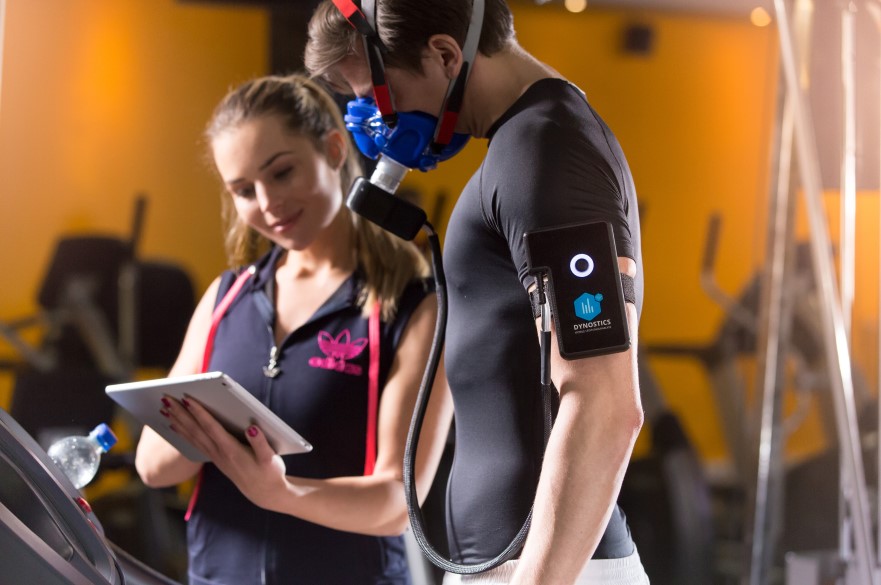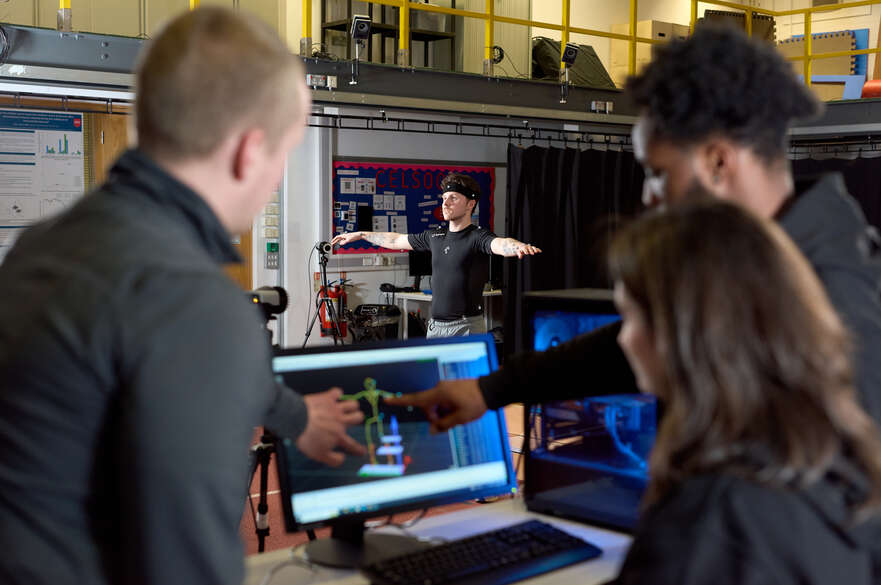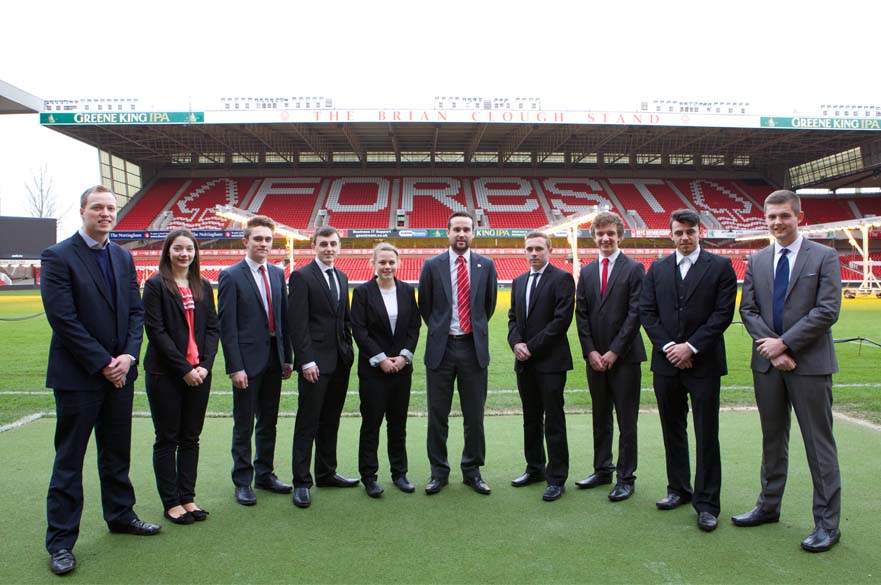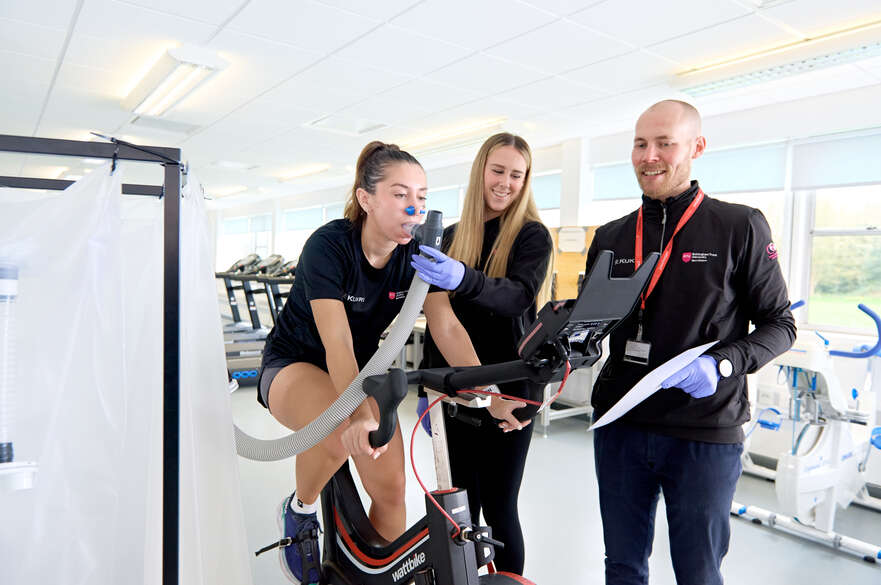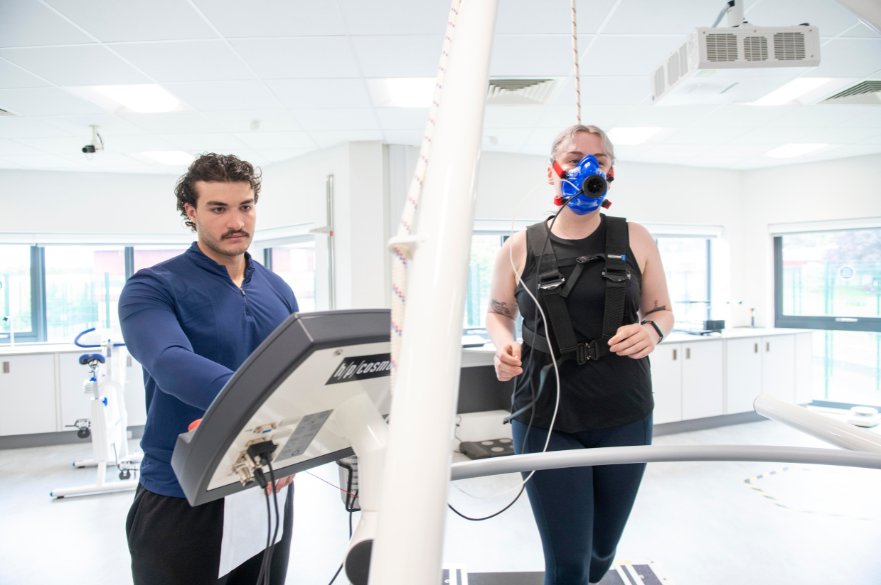This course is in Clearing
Offers from 80 tariff points
About this course
Nothing is more important than our wellbeing. But for many of us, modern life stands in the way of taking proper care of ourselves – from an increase in desk jobs and working from home, to the rising culture of convenience foods.
Sports science, health and nutrition targets everyone, from schoolchildren to the elderly, and from the most inactive members of our community to performance athletes at the top of their game. On one hand, it’s about encouraging healthy habits, combating poor diets, and sharing the benefits of physical activity with people far and wide. On the other, it’s about delving into sports psychology, physiology and culture; interrogating the relationship between nutrition and exercise performance at elite levels; and devising innovative techniques and diet plans to maximise athletes’ success.
On this course, you’ll take a holistic approach to sport and wellbeing, and work with real people to revolutionise their lifestyles. You’ll transfer your learning from the classroom into the community, turn culinary concepts into kitchen creations, and apply new practices to performance athletes’ routines.
Why study this course?
What you’ll study
BSc Sport Science, Health and Nutrition at NTU covers all bases in the field. You’ll unpack the psychology behind people’s behaviour and attitudes towards sport and health, investigate the anatomy and physiology behind exercise, and explore the biological functions of the nutrients we consume. You’ll make a tangible difference to people’s lives as you learn, applying your knowledge to live briefs from within NTU and set by our partner organisations.
From Year Two onwards, you’ll benefit from an extensive range of optional modules – covering topics from sociological and cultural approaches to sport and health, to the biology and physiology behind exercise – allowing you to tailor your degree and home in on your chosen career path.
You’ll also have the opportunity to get a Chartered Institute for the Management of Sport and Physical Activity (CIMSPA) Personal Trainer qualification alongside your degree.
Study highlights include:
- Investigate key topics in sport sciences for health, like nutrition, physiology, psychology and sociology.
- Gain crucial work-like experience with our dedicated Sport and Wellbeing Academy, where you’ll take real clients through a 12-week exercise programme and offer nutrition advice, guided by experienced industry professionals.
- Get hands-on and develop your physiology testing skills in our high-tech laboratories.
- Expand your industry network as you work on live briefs set by organisations like the NHS, Nottingham City Council and Healthy Eating Solutions Ltd.
- Work with NTU Health Promotion Specialists on real-life briefs to improve the health of NTU students and staff.
- Get additional qualifications alongside your degree, like a Diploma in Professional Practice during a placement year, and a Personal Trainer certification with CIMPSA.
- Boost your employability further by learning a language alongside your sports nutrition studies on our University Language Programme (ULP).
Here’s a full breakdown of your modules.
Introduction to Sport and Exercise Physiology (20 credit points)
This module provides the foundations of the key human systems (anatomical and physiological) and their responses and adaptations to sports and exercise.
Foundations of Sport and Exercise Psychology (20 cp)
Examine the psychological consequences of engaging in sport and exercise and the mental factors that impact quality sport and exercise experiences.
Food and Healthy Eating (20 cp)
You will study the basic principles of food microbiology, nutrition and health claims, and health promotion, as well as learning how to develop effective community healthy eating interventions.
Sport Culture and Society: a critical introduction (20 cp)
Explore the importance of the social sciences in understanding sports and in the education of every sports professional.
Foundation Nutrition (20 cp)
Learn the essential principles and concepts of nutrition, focusing on the structure and function of nutrients, the effects of consumption and the methods for assessing nutritional intake and status.
Developing Academic and Research Skills (20 cp)
Core modules:
Clinical Exercise Physiology (20 cp)
Explore how exercise physiology can be used in assessing, preventing, and treating disease and poor health, including risk assessment and exercise screening, assessing health using simple, cost-effective testing procedures and measuring physical activity and sedentary behaviour.
Behaviour Change, Physical Activity and Health (20 cp)
Learn about evidence, methods and theory in relation to changing and maintaining behaviour(s) relevant to health and well-being.
Applied Nutrition (20 cp)
This provides an opportunity to apply your knowledge of nutrition to a range of different circumstances across the lifespan.
Sport and Exercise Nutrition (20 cp)
Understand the role nutrition has on an athlete’s performance. You’ll study the physiological and biochemical processes the human body performs to access the nutritional components of the food we eat. Following an evaluation of dietary needs, you’ll be able to design a nutritional plan to optimise training and performance in sport at all levels.
Integrated Applied and Professional Skills (20 cp)
Using inquiry-based learning, students will continue to learn about the research process and gain an understanding and experience of how research is conducted within the field of exercise, nutrition and health.
Optional modules - choose one:
Applied Sport and Exercise Physiology (20 cp)
This module outlines, theoretically and practically, how bouts of physical exercise alter the body’s structures and functions and how these concepts can be applied to training to enhance exercise tolerance and sport performance.
Practical Applications in Sport and Exercise Psychology (20 cp)
In this module, students develop the principles from Foundations in Sport and Exercise Psychology and relate them to sport, coaching, management and exercise contexts.
Sociology of Sport, Health and the Body (20 cp)
Explore the fundamental concepts across the sociologies of sport, health, and the body, including emotion, physical culture, vulnerable bodies and why we work out.
Optional year-long work placement. If you are not taking a placement, you will progress directly to your final year in year three.
Core modules:
Sport Project and Dissertation (40 cp)
You will produce original and independent work in a specialist area of sport science, coaching, exercise science or sport and leisure management, depending on your focus.
Applied Topics in Exercise Nutrition and Health (20 cp)
Explore the current topics in nutrition and health through group discussions, guest lectures, debates, workshops, and journal clubs. You'll also develop your professional skills by enhancing your communications methods for health promotion, applying good clinical practice and studying current legislation.
Disease, Illness and Injury (20 cp)
Investigate injury management and illnesses that occur in sports and exercise. You'll examine the epidemiology, mechanisms and risk factors and the use of strategies to avoid and lessen the occurrence of sports injuries and illnesses.
Current Topics in Sport and Exercise Nutrition (20 cp)
Optional modules - choose one:
Transforming Sport: Sustainability and Social Justice (20 cp)
Study and challenge the accepted beliefs and practices of those who govern and promote sport. Drawing on a variety of topics, this module presents a case for sport sociology as an agent of positive change in sport.
Strength, Power and Endurance for Sport and Exercise (20 cp)
The module typically focuses on six topics related to applied exercise physiology and strength and conditioning research.
Advanced Topics in Sport and Exercise Psychology (20 cp)
You will become familiar with selected areas such as motivational climate, athletic identity, mental toughness, psychology of injury and morality in sports. The emphasis of this module will be placed on current primary research.
We regularly review and update our course content based on student and employer feedback, ensuring that all of our courses remain current and relevant. This may result in changes to module content or module availability in future years.
Don’t just take our word for it, hear from our students themselves
Video Gallery
How you're taught
How will I learn?
Our sports science department comprises a team of experts with decades of experience between them, ranging from long-time industry professionals to academic researchers. You’ll be taught by the impressive minds behind NTU’s life-changing research, and working with the very same facilities and equipment they use.
This BSc Sport Science, Health and Nutrition course is endorsed by the British Dietetic Association’s Sport and Exercise Nutrition Register (SENR), guaranteeing high-quality learning and making you eligible to apply to the SENR Graduate Register after completing an appropriate postgraduate qualification.
You’ll learn through a mix of:
- lectures, covering the key theories and most pressing issues in sports nutrition and exercise science
- seminars, which are smaller-group sessions perfect for collaborative working and learning new skills
- practical workshops using our extensive range of industry-standard facilities
- external visits to the organisations which set your live briefs.
Study abroad opportunities
Get ready to embark on an adventure with our study abroad programs at partner universities or by getting a work placement overseas. Both opportunities will boost your employability, build lifelong friendships, and allow you to experience the world in a whole new way.
How you're assessed
People excel in different ways, and we want everyone to have the best possible chance of success. That’s why we’ve adopted a range of assessment types on this course, including:
- coursework, including group projects, case studies, dissertation and other assignments
- practical assessments, such as individual and group presentations, laboratory assessments and lab reports
- written exams and multiple-choice tests.
Careers and employability
As physical inactivity and poor nutrition rise, so does the demand for our BSc Sport Science, Health and Nutrition graduates.
This isn’t just any sports science degree: the broad and flexible nature of this course can lead to a wide range of roles across the health and fitness sector, where you can continue to make a positive difference to communities and individuals. With work-like experience built into your course and countless opportunities for career development, you’ll graduate as a competent, confident and highly desirable candidate to employers.
Our graduates have previously secured roles such as:
- Dietetic Assistant Practitioner
- Health Adviser
- Health and Wellbeing Coach
- Nutritional Analyst
- Personal Trainer
- Healthy Lifestyle Practitioner
The organisations they work for include the NHS, Nutracheck, BUPA, Nuffield Health, Nottingham Forest Football Club, Derby City Council, DW Sports Ltd and Waitrose.
Sport and Wellbeing Academy
Our Sport and Wellbeing Academy offers additional work-like experience opportunities for our sports nutrition students, with the help of our tremendous community partners. You'll get the chance to work alongside our experienced Senior Exercise Practitioners to deliver programmes which help improve the health and wellbeing of local people. Find out more about the Academy.
Placements
We're in the top 10 for the number of undergraduate students studying Sport Sciences on year-long placements (HESA 2023/24).
As a BSc Sport Science, Health and Nutrition student, you can complete a year-long placement (or ‘sandwich year’) after Year Two, on a paid or voluntary basis. This is a very popular route and an excellent way to gain the vital work experience that employers look for and expand your industry network. In fact, it’ll make you twice as likely to be in employment six months after graduation.
We’ll support you throughout your placement, and you’ll be able to complete a Diploma in Professional Practice while you work.
Our most recent placement students have worked at organisations like:
- NHS
- Nova Centurion Swimming Club
- Samworth Brothers
- Wholygreens
- ABP Food Group
- Identity Agency
Employability and NTU Enterprise
You’ll be supported by our award-winning Employability team up until three years after graduation, and be able to access our online career resources for life. If you’re thinking of turning your sports nutrition and fitness expertise into a business, NTU Enterprise can help turn your plans into reality. Find out more about our Employability offer.
Campus and facilities
You’ll mainly be studying in the Erasmus Darwin and CELS Buildings with access to facilities including an environmental chamber, biomechanics lab, and nutrition suite:
We have the stimulating and creative environment needed to equip students with the knowledge and transferable skills to put them ahead of the graduate crowd. We provide first-class facilities that enhance the quality of our education and push the boundaries of our research, these include:
The University has a wide range of sporting and health-related facilities across three of our campuses. You will have access to:
- sport coaching
- sports injury clinics
- fitness suites
- specialist facilities
- more than 40 sports clubs.
Sport, Exercise and Health Physiology Laboratories
Our laboratories are fully equipped with specialist facilities. You will find high-quality, dynamic learning environment to cater for different types of exercise testing and physical activity.
British Olympic Association (BOA) Approved Environmental Chamber
This chamber enables us to simulate climates anywhere in the world, from Everest to Egypt. Olympic athletes have used the chamber to acclimatise to extreme competition environments.
Biomechanics and Performance Analysis Suite
Our Biomechanics and Performance Analysis Suite includes isokinetic and isometric dynamometers for assessment of force produced by muscle groups of the body. You will also find a 3D camera motion analysis system.
Culinary Skills Teaching Kitchen and the Clifton Sports Hub Nutrition Suite
You will have the opportunity to develop your cooking skills and deliver cook and eat sessions in our Culinary Skills Teaching Kitchen and the Clifton Sports Hub Nutrition Suite.
IT, Sport Psychology and Management Suites
The School also features IT, Sport Psychology and Management Suites. These are used for analysing following:
- matches
- statistics
- nutrition
- coaching
You will also have a host of sporting clubs and societies to get involved in.
Your campus
Our self-contained, community-focused Clifton Campus has been designed to keep students busy between lectures. Catch-up with your course mates in the Pavilion’s barista café and Refectory; brainstorm group presentations in chic and stylish study spaces; enjoy some proper R&R in The Point, home of our Students’ Union. The campus also hosts the multimillion-pound Clifton Sports Hub, offering great options for everyone — whatever your interests, and however competitive you’d like to get!
Your city
Take a few steps off campus and you’ll find yourself in the heart of Nottingham — one of Britain’s top 10 student cities, and one of Europe’s top 25. As well as offering a great social scene, it’s one of the UK’s key sporting hubs, home to the iconic Trent Bridge Cricket Ground; Notts County (the world’s oldest professional football league club) and two-time European Cup-winners Nottingham Forest; the Nottingham Tennis Centre, the National Ice Centre, and the National Watersports Centre at Holme Pierrepont; plus rugby union, rugby league, hockey and ice hockey teams.
Entry requirements
This course is in Clearing
Looking for a place in Clearing? We are accepting application and would love to hear from you!
UK students
This course is in Clearing
Looking for a place in Clearing? We are accepting applications and would love to hear from you!
Clearing requirements
From 80 UCAS tariff points from up to 4 qualifications.
To discuss our entry requirements and see what we can offer you, call us now on +44 (0)115 848 6000. Alternatively, if you already have your qualifications, apply online via our Clearing Application form.
Preparing for results day? Beat the queue and sign up for NTU Priority for up-to-date information about all things Clearing. You’ll get an offer ahead of Clearing, subject to you achieving the required grades on results day.
- 80 UCAS Tariff points from up to four qualifications, including A-level equivalent a PE or Science subject*
If you are applying with a BTEC Extended Certificate (previously BTEC Subsidiary Diploma), you will also need an A-level in a science subject or equivalent.
* We will accept Biology, Chemistry, Physics, Maths, Sport Studies or Psychology.
To find out what qualifications have tariff points, please use our tariff calculator.
Additional requirements for UK students
There are no additional requirements for this course.
Contextual offers
If you don’t quite meet our entry requirements, we might be able to make you a lower offer based on a range of factors, including your background (such as where you live and the school or college you attended), your experiences and your individual circumstances (you may have been in care, for example). This is called a contextual offer, and we get data from UCAS to help make these decisions. We do this because we believe everyone with the potential to succeed at NTU should have the opportunity to do so, no matter what barriers you may face.
Meeting our entry requirements
Hundreds of qualifications in the UK have UCAS Tariff points attached to specific grades, including A-levels, BTECs, T Levels and many more. You can use your grades and points from up to four different qualifications to meet our criteria. Enter your predicted or achieved grades into our Tariff calculator to find out how many points your qualifications are worth.
Other qualifications and experience
NTU welcomes applications from students with non-standard qualifications and learning backgrounds, either for year one entry or for advanced standing beyond the start of a course into year 2 or beyond.
We consider study and/or credit achieved from a similar course at another institution (otherwise known as credit transfer), vocational and professional qualifications, and broader work or life experience.
Our Recognition of Prior Learning and Credit Transfer Policy outlines the process and options available for this route. If you wish to apply via Recognition of Prior Learning, please contact the central Admissions and Enquiries Team who will be able to support you through the process.
Getting in touch
If you need more help or information, get in touch through our enquiry form.
International students
This course is in Clearing
Looking for a place in Clearing? We are accepting applications and would love to hear from you!
Clearing requirements
From 80 UCAS tariff points from up to 4 qualifications.
To discuss our entry requirements and see what we can offer you, call us now on +44 (0)115 848 6000. Alternatively, if you already have your qualifications, apply online via our Clearing Application form.
Preparing for results day? Beat the queue and sign up for NTU Priority for up-to-date information about all things Clearing. You’ll get an offer ahead of Clearing, subject to you achieving the required grades on results day.
- 80 UCAS Tariff points from up to four qualifications, including A-level equivalent a PE or Science subject*
- We accept equivalent qualifications from all over the world. Please check your international entry requirements by country.
- English language requirements: See our English language requirements page for requirements for your subject and information on alternative tests and Pre-sessional English.
If you are applying with a BTEC Extended Certificate (previously BTEC Subsidiary Diploma), you will also need an A-level in a science subject or equivalent.
* We will accept Biology, Chemistry, Physics, Maths, Sport Studies or Psychology.
Additional requirements for international students
If you need help achieving the academic entry requirements, we offer a Foundation preparation course for this degree. The course is offered through our partner Nottingham Trent International College (NTIC) based on our City Campus.
English language requirements
View our English language requirements for all courses, including alternative English language tests and country qualifications accepted by the University.
If you need help achieving the language requirements, we offer a Pre-Sessional English for Academic Purposes course on our City campus which is an intensive preparation course for academic study at NTU.
Other qualifications and experience
If you have the right level of qualifications, you may be able to start your Bachelors degree at NTU in year 2 or year 3. This is called ‘advanced standing’ entry and is decided on a case-by case basis after our assessment of your qualifications and experience.
You can view our Recognition of Prior Learning and Credit Transfer Policy which outlines the process and options available, such as recognising experiential learning and credit transfer.
Sign up for emails
Sign up to receive regular emails from the International Office. You'll hear about our news, scholarships and any upcoming events in your country with our expert regional teams.
Getting in touch
If you need advice about studying at NTU as an international student or how to apply, our international webpages are a great place to start. If you have any questions about your study options, your international qualifications, experience, grades or other results, please get in touch through our enquiry form. Our international teams are highly experienced in answering queries from students all over the world.
Policies
We strive to make our admissions procedures as fair and clear as possible. To find out more about how we make offers, visit our admissions policies page.



